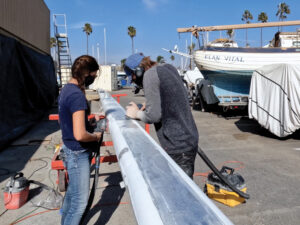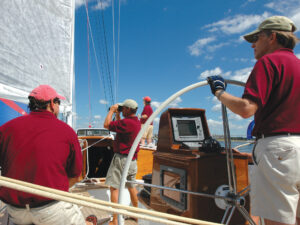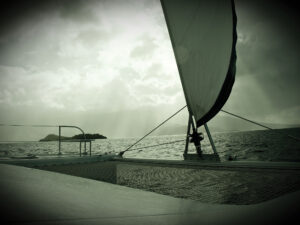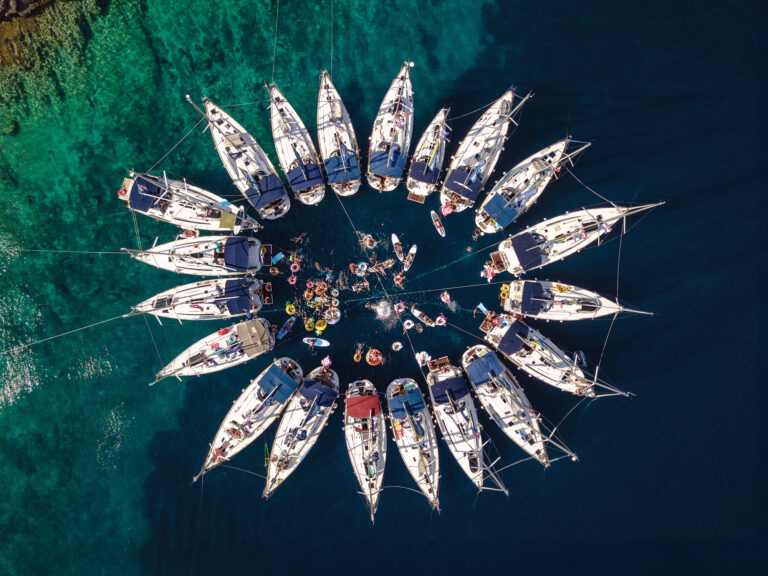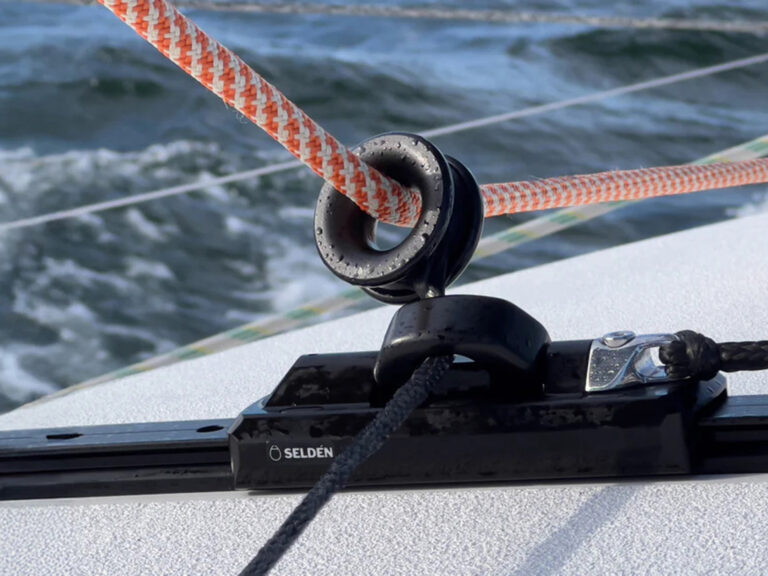
When cruising for any long period of time with their children, parents have plenty to worry about: safety, schooling, keeping a constant supply of snack food within reach. But there are more subtle aspects of growing up on the water that parents don’t always see, and as a former liveaboard kid, I am here to illuminate some of those. Here are several ways you can help keep your cruiser kid content.
Essential No. 5: Privacy
Some cruiser kids are lucky enough to enjoy their own cabin, but many of our boats are not so spacious. If you have more than one child, space can be an even bigger problem, as tempers often flare when you’re practically sleeping atop one another. But there are some simple ways of giving your kids a “room of their own” and a place to vent.
- Curtains: My own bunk was long and narrow with an overhang that formed part of my brother’s bunk. My parents helped me rig up a set of beautiful batik curtains, and instantly I had a space to call my own. I could close my curtains and go to my own little world.
- Interior decorating: We all know having enough room on a boat is difficult, but let your kids spread out a little bit. I had a cubby next to my pillow in which I kept all my boxes, trinkets and random things I valued. I also hung up pictures, painted on the walls of my bunk and strung up lights. Whatever kids want to do to personalize their space and create a home, within reason, let them do it.
- Alone time: Make sure your child gets some time away from the rest of you. Ditch them on the nearest island and let them wander, or leave them alone on the boat for an hour or two. This is especially essential if your child is going through puberty. There were times when I needed the place to myself in order to sort out my own thoughts.
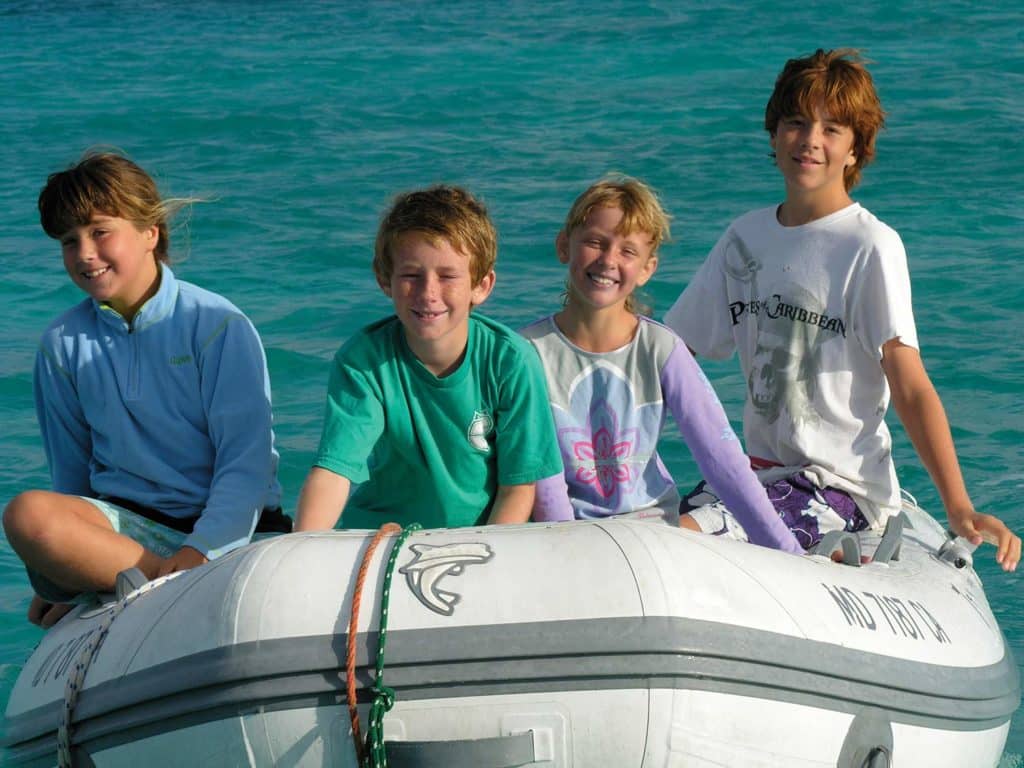
Essential No. 4: A Measure of Freedom
All boats can get small quickly. Make sure you give your kids some time to roam in places you feel comfortable.
- Let them drive the dinghy: This is a biggie. If your kids are old enough, teach them to operate the tender. After all, they’re not going to have a car for a while if you’re cruising long term; a dinghy is the next best thing. My brother could drive our RIB, and being able to zip ashore or over to a friend’s boat was a lot of fun.
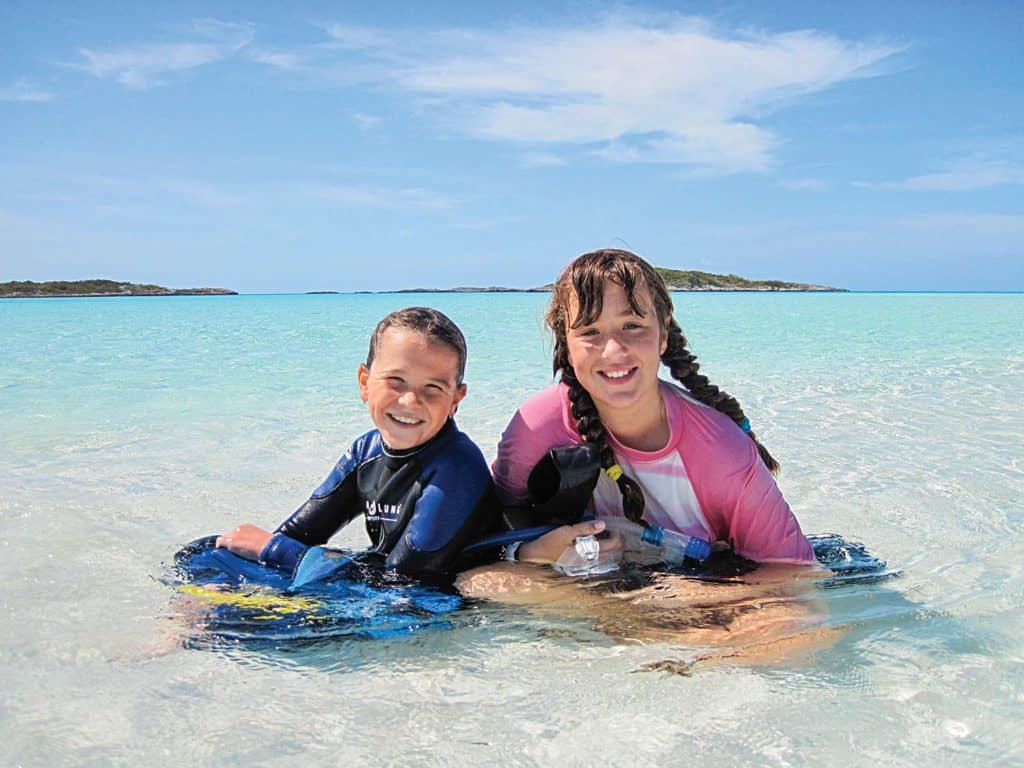
- Try not to condescend: Just because they’re kids does not mean they can’t handle responsibility. If you give your children certain jobs that are vital to the smooth running of the boat, they will begin to feel their importance as well. My brother started standing night watch on passage when he was 14. I would often stay up with him, and I remember knowing that the safety of our home and our family was our responsibility. Such duties will help your children grow and make them proud of their role on board.
- Don’t beat them over the head about schoolwork: I can feel the skepticism from here, but bear with me. If you’re home-schooling, you may find that this is one of the subjects that causes the most friction between you and your kids. I am not advocating slacking off, schoolwork is very important, but don’t make it an all-day thing. Keep their noses to the grindstone for a few hours, then turn them loose to enjoy the rest of the day.
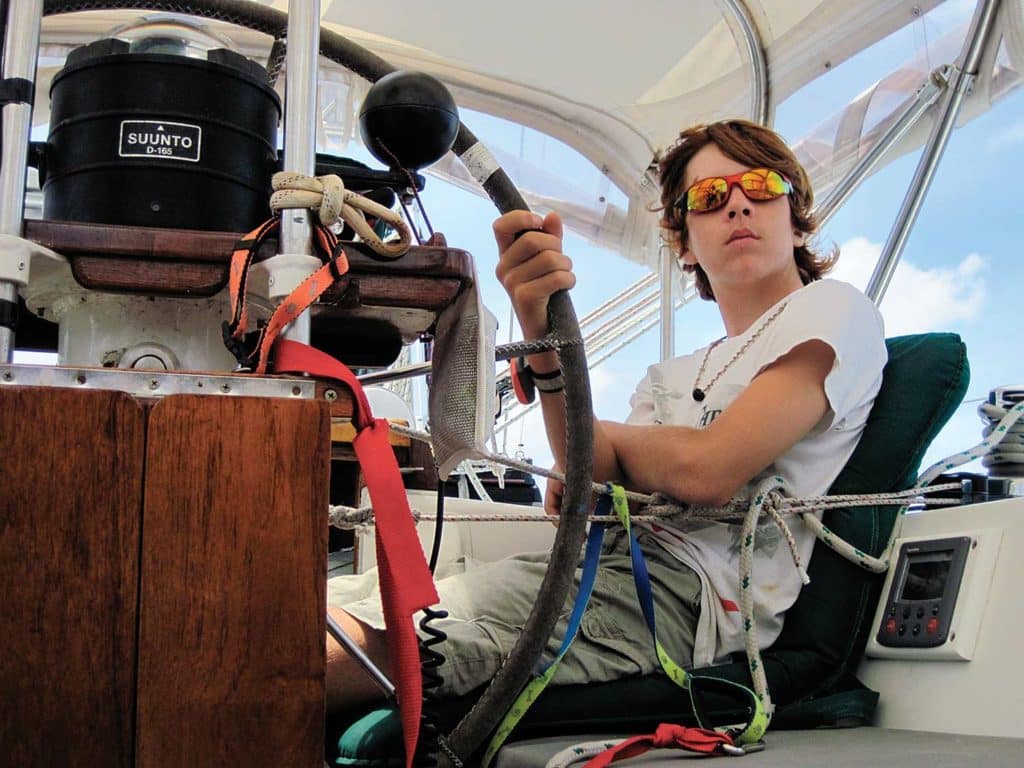
Essential No. 3: Entertainment
In this day and age, most kids turn to the internet to kill time. In many cruising destinations, this won’t be an option. When they’re not out exploring or otherwise occupied and looking for some downtime entertainment, here are some suggestions to keeping your kid from leaping overboard in boredom (though, depending on where you are, that’s not a bad idea).
RELATED: Family Cruising in Alaska
- Bring books (or a Kindle): If your child is at all like me and my brother, they’ll do this anyway. In our cabin, practically every free inch was devoted to bookshelves. Make sure you bring along plenty of literary entertainment, and give your child places to keep their books. If you are short on room or just aren’t inclined to lug a ton of books around, Kindles and other e-readers have come a long way in the last few years and may be a better option, although you’ll still want room for those unexpected treasures from book exchanges.
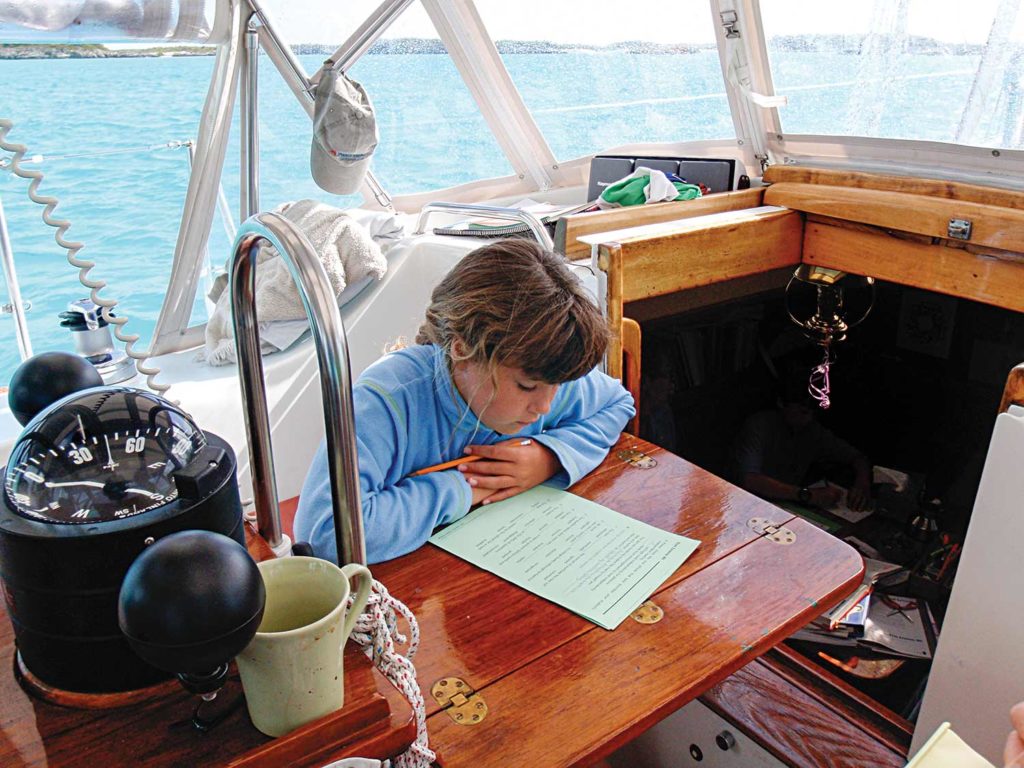
- Movies and some way of watching them: This was what my brother and I did before we really knew what the internet was. We watched movies all the time when we were cruising — on passage, home alone or just when we weren’t doing anything else. I recommend stocking up on movies however you can. We kept ours either as discs in soft cases or on a hard drive as VLC files. As for playing devices, in addition to the laptop, we had a portable DVD player, which worked great.
- Music: Music is absolutely invaluable on a boat, and for many, it’s an emotional outlet. Install a stereo, bring plenty of headphones, and if you can find one, I strongly suggest a “classic” iPod. Ours was first-generation, small and easily protected from the elements, and had over 7,000 songs with room for more. Music also turns many boat chores, like doing the dishes or polishing steel, from menial tasks to enjoyable jam sessions. And for the angsty teen, popping in some earbuds and tuning out reality can be soul-saving.
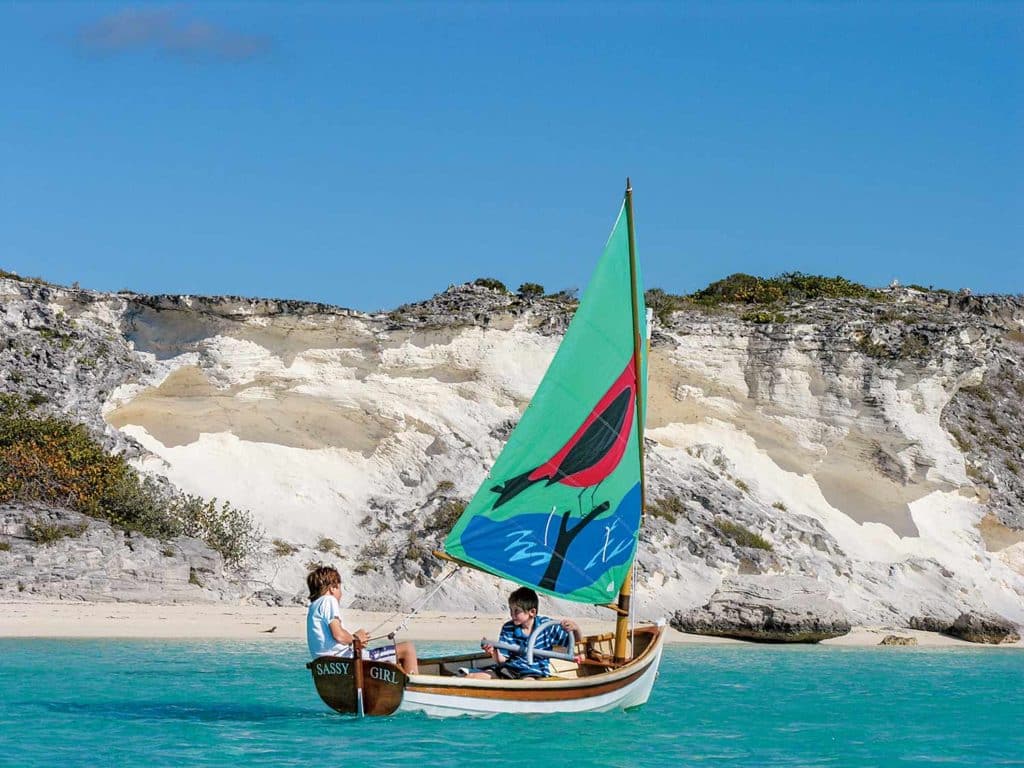
Essential No. 2: Other Kids
This is one of the most fretted-over aspects of living aboard, for parents and kids. Loneliness is difficult, especially for only children, and is sometimes alleviated solely by the presence of other kids. But finding kid boats can be hard, and finding kid boats following your route, harder still. Thankfully, there are ways for your children to find friends on the water and stay connected once your paths diverge.
- Make an effort to find other kid boats: There are several ways you can do this — the most effective of which is over the single sideband radio nets. Ask about kid boats in your area or headed for somewhere you could meet up. We met a kid boat over the SSB in 2009 and stuck together for many miles. (They’re still among our closest friends). Other ways of tracking down kid boats include the VHF, through a variety of cruising kids websites or Facebook pages (if you have internet — always a big if), through the sailing grapevine, or by visiting popular spots like George Town in the Bahamas, where liveaboard families often gather for exactly this purpose.
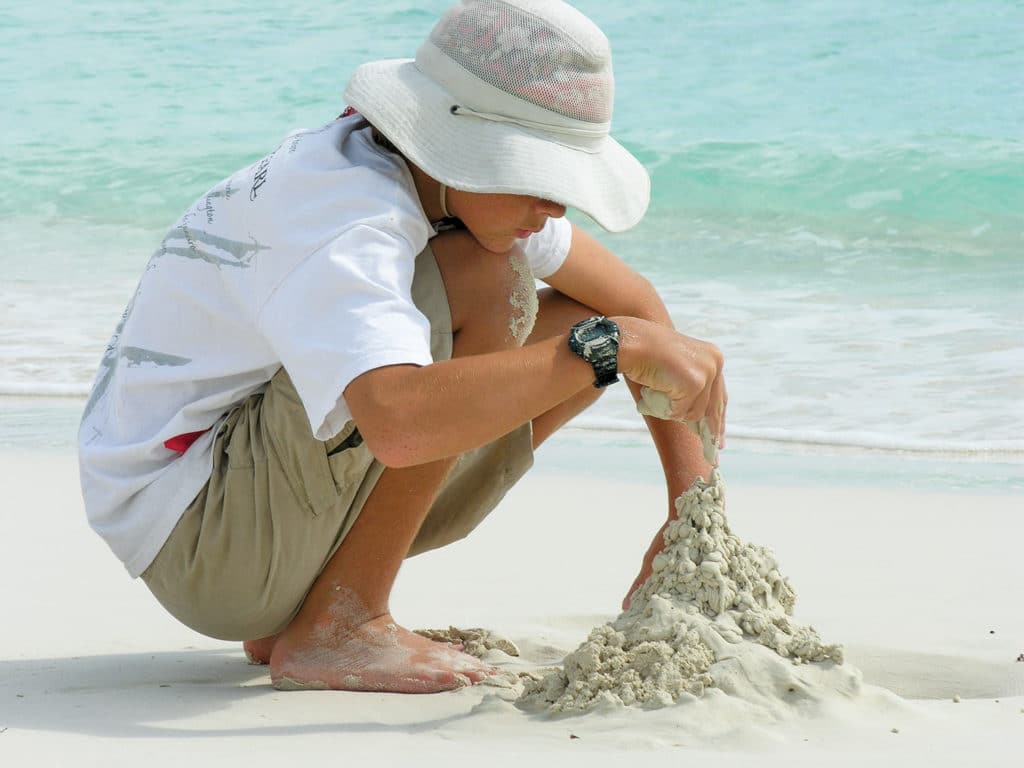
- Help your kids connect with their friends back home: This is a steep order, since internet can be rare and phone service expensive. If you find yourself with decent internet, instant messaging (Google Hangouts are popular) — as archaic as it may seem now compared to texting — is a good method. Plop a computer in front of your kid and let them at it; my friends and I used to type together for hours.
- Encourage them to play with local kids: While we often didn’t share a language with them, many of the local kids my brother and I befriended were perfectly happy to let a game of soccer or volleyball do the talking. Even if your kids are shy, encourage them to go outside their comfort zones and kick up a game, or figure out how to ask and join in on one. In the long run, this helped my brother and me be more brave and outgoing, and it also gave us some wonderful memories.
Essential No. 1: Listen to your Kids
My final essential may come as a surprise, but in my years living aboard there was nothing more important than having fair and understanding parents. Living in a small space with your entire family is challenging. The best thing a parent can do in such an environment is to always listen their children. Teenagers are not aliens, despite popular belief. Just remember that these are your kids, not strangers. Being accepting and understanding of them is one of the most important things any parent, cruiser or otherwise, can do for them.
Kailani Clarke cruised with her family for five years aboard Osprey, a 45-foot steel cutter. She is currently a student at Washington College.

